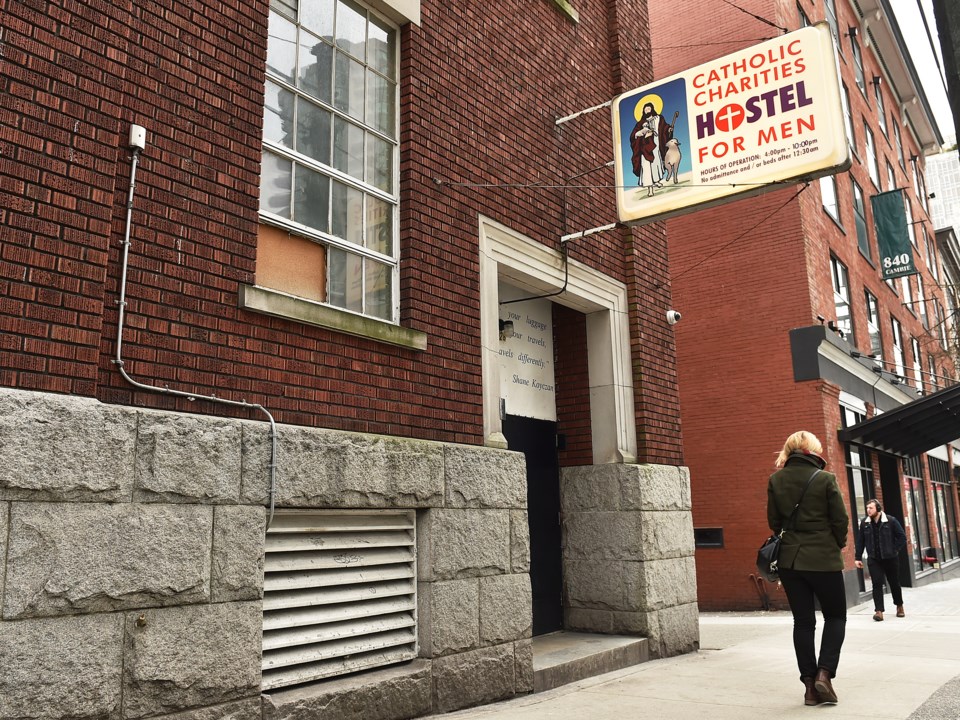The ears of the Minister of Municipal Affairs and Housing must have been burning.
On Monday, Selina Robinson’s ministry issued a news release saying it has approved an additional $3.1 million to keep eight Vancouver shelters open beyond their March 31 closing date.
The eight shelters, which total 240 beds, will now operate until March 31, 2020.
The move from government comes after COPE Coun. Jean Swanson introduced a motion to council Feb. 26 requesting that winter shelters be kept open year-round. Swanson’s motion was to be heard Tuesday at city hall while I was writing this piece.
But technology being what it is, I picked up the phone Monday and spoke to Swanson. And in her get-to-the-point way, this is what she said:
“I hate shelters, right. They’re deplorable. We need housing.”
Anyway, she continued, extending the operation of the shelters is a “no-brainer” in the interim.
“I was at the Gathering Place [shelter] last year or the year before it closed and people there were crying,” Swanson said. “They were saying, ‘What am I going to do? I have cancer, I just had a heart attack, I can’t live on the street, I can’t find any housing.’ It was terrible.”
She then went about calculating the cost to keep each of 240 beds open until March 2020. It’s close to $13,000 a bed. Since being elected last October, Swanson has been doing a lot of math on the cost of this or that, and how the money would be better spent on building permanent housing.
"We could do nice modular housing so the foundation would be permanent," she said of the pre-fabricated housing that is cheaper than constructing concrete highrises. "It's so doable. All we need is the money for it, and the province and the feds should pay for it. Or else they should give the city the power to get the revenue to do it."
Swanson said she doesn’t want the provincial government—or the federal government, for that matter—to think that shelters are the way out of homelessness. In addition to the temporary or winter shelters, there are 940 permanent shelter spaces in Vancouver and 120 beds that open when the weather is severe.
The city also opens two community centres, the main branch of the public library and the Powell Street Getaway as “warming centres” when the temperature reaches minus 5 degrees, or feels like minus 5 degrees.
In recent conversations with Housing Minister Robinson and Social Development Minister Shane Simpson, they’re keenly aware of the need for permanent housing. As Robinson told me last week, the government is working on it.
The 606 temporary modular housing units that have gone up in Vancouver since last March are an example of that work.
And, according to the release issued Monday, the government said “work has started on more than 2,450 affordable rental homes in Vancouver as part of the province’s investments in affordable housing, some of which include shelter-rate units.”
I’ve asked for more information on that sentence to understand what affordable rental means and how many will rent for the $375 shelter rate. I was expected to get that information late Tuesday afternoon, and will update this piece when I get it.
“That is the big question—how many are shelter-rate units?” Swanson said. “It is so frustrating that they say ‘social housing’ and you don’t have a clue what the rents were. Unless they’re renting for shelter or pension rate, they’re completely useless to people who are homeless.”
I tuned in to Tuesday’s council meeting via my computer and it looked as if it would be a while before Swanson’s motion from Feb. 26 would be back on the table. But isn’t it moot now, councillor?
Swanson wouldn’t say Monday whether she planned to withdraw the motion, or have something else to say about it.
Meanwhile, Vancouver conducts its 10th consecutive homeless count March 12 and 13. Last year, volunteers counted 2,181 people without a home—659 on the street and 1,522 in some form of shelter. It was an all-time high.
So does Swanson think this year’s count will see a decrease in the number of homeless people?
“If it goes down, I don’t think it will go down much,” she said. “And if it goes down, I think it will be because of the opioid crisis.”
Of the 1,489 people in B.C. who died of an overdose last year, 382 died in Vancouver.
The BC Coroners Service said 58 per cent of the 1,489 deaths occurred in private residences. Twenty-four per cent died in other homes including social and supportive housing, single-room-occupancy hotels and shelters.
Another four per cent died in “other inside locations” and 12 per cent died in vehicles, on sidewalks, streets and in parks.
I’ve asked for a breakdown specific to Vancouver and will report back if and when I get it.
The eight shelters that will remain open until March 31, 2020 are at 828 Cambie St. (20 beds), 1138 Burrard St. (12 beds), 1060 Howe St. (40 beds), 131 Dunlevy St. (16 beds), 134 E. Cordova St. (40 beds), 138 E. Cordova St. (30 beds), 1401 Hornby St. (40 beds) and 1648 East First Ave. (40 beds).
mhowell@vancourier.com
@Howellings



